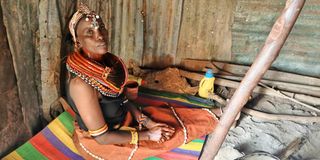As Kenyans vote on Tuesday, the Rendille will be marking their ‘passover’

Ms Hiroiyia Lechipan from Loglogo village in Marsabit County while dressed in traditional Rendile attire waits patiently in her manyatta to receive meat from her first born son to prepare for the ongoing Sorio festival on August 8, 2022. Women do not participate directly in the ceremony but they prepare meat from the sacrificial land.
As a majority of Kenyans queue to pick their next crop of leaders on Tuesday, a community in northern Kenya will be conducting one of its most revered cultural festivals.
The elaborate Sorio or the feast of the new moon is so highly regarded among the Rendille community that participation in the General Election will temporarily take a back seat, with elders conducting the house-to-house ceremony that includes slaughtering sacrificial lambs.
It is only after the ceremony that those registered to vote will head to their respective polling centres to cast their ballots, while those who travelled from far will miss the opportunity to participate in this democratic process.
“The calendar of the Sorio feast is dictated by the sighting of the new moon where we count nine or 10 days depending on the clan and then carry out the ceremony,” explains Mzee Lokoti Kutukai, an elder in Loglogo village in Marsabit County.
“This time, the 10th day coincided with the day set for the General Election and we had no option but to carry on with this age-old festival.”
Jewish Passover
Mzee Kutukai, 83, says the festival that bears great resemblance to the Jewish Passover has been practised by his community for generations and involves blessing the firstborn son in a homestead where the blood is used to bless the family and their livestock.
The ceremony takes place three times a year and it is a requirement that the firstborn son in a particular family attend without fail unless under very special circumstances.
“A special lamb without any blemish is selected by the identified families to be slaughtered, its blood smeared among the family members and their livestock,” says the elder, stressing that boys are highly regarded in the community.
“It is the firstborn son who leads this blessing ceremony under the supervision of elders, and families that have not sired boys are normally skipped.”
The ceremony begins at 6am before the herd leaves for the grazing fields, with milk part of the festivities, where it is emptied into a calabash and poured on the front door of the house.
The same milk is then sprinkled on the back of the lamb, ears, belly and the tail to symbolise purity before slaughtering. The firstborn son in the family will wipe their walking sticks on the back of the animal.

An elder from Loglogo village in Marsabit County pours milk on the doors of a manyatta as a sign of blessing the homestead during the ongoing two-day cultural festival called Sorio on August 8, 2022. The Rendile Community ceremony that bears great resemblance to the Jewish Passover is to take place on August 9, 2022.
When slaughtering is done, the blood pours into a bowl-shaped hole in the ground in which the firstborns will dip their walking sticks in and hand it over to the last process where the women will take the goat meat for preparation of the feast. Women do not take part in the actual ceremony but remain indoors to receive the meat and prepare the feast.
Some of the blood from the slaughtered lamb will be smeared on the face of the children in the family, including girls, on the backs of camels, cows, sheep and goats as a sign of blessing.
According to Mr Lekure Lechipan, one of the elders conducting Monday’s ceremony, the origin of this important community feast is unknown but has been passed on through the generations with strict adherence to its calendar. Sorio is conducted three times a year and firstborn sons travel from far and wide to participate in it.
The ceremony normally takes two days, with members of certain clans counting nine days and others 10 before the feast can kick off. This is why the day-long festival in all regions occupied by the Rendille community started on Monday, August 8, and will continue to the following day, August 9.
Ms Margaret Super, who has been documenting the culture and traditions of her Rendille community, says the ceremony is aimed at protecting families from misfortunes.
Young boys
“This is something that has been passed down from generation to generation orally and young boys are always invited to witness this feast,” explains Ms Super, who leads the Pastoralist People’s Initiative, a community-based organization.
“Folktales have it that many years ago, the forefathers warned that failure to adhere strictly to this practice would lead to deaths of children in the family as well as livestock. Hence it is something they will do religiously guided by the lunar calendar.”
The biblical Passover
The book of Exodus in the Christian Bible details how Moses was commanded by God to lead the Israelites out of slavery in Egypt. But the leader of Egypt, the pharaoh, remained defiant, prompting God through Moses to cause several plagues or disasters.
But the pharaoh remained defiant even after nine plagues had been unleashed and it was then that God ordered the 10th and most fearsome plague.
Every firstborn would die that night except those who remained in houses where a lamb had been sacrificed and its blood painted on the doorposts of that house.
In those houses, the promise was that everyone would be safe. Death would pass over that house, hence the name Passover.





